北师大版(2019)选择性必修 第三册Unit 9 Human Biology The Perfect完成时态课件(共35张PPT)
文档属性
| 名称 | 北师大版(2019)选择性必修 第三册Unit 9 Human Biology The Perfect完成时态课件(共35张PPT) | 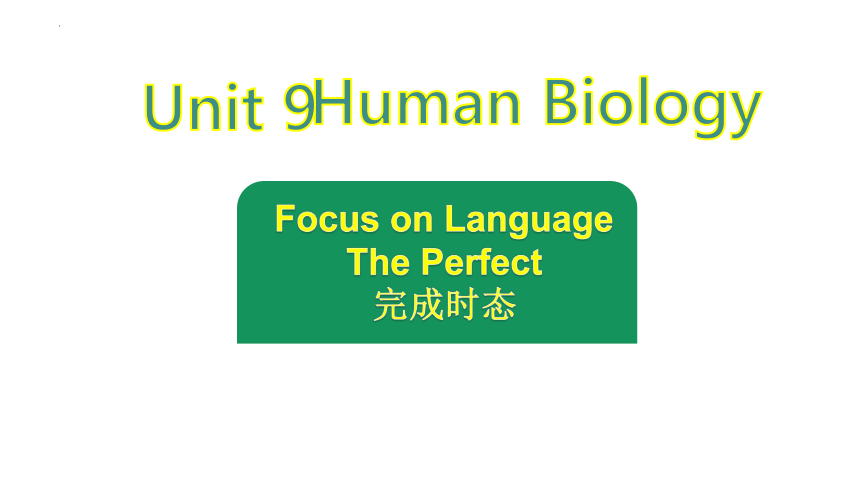 | |
| 格式 | pptx | ||
| 文件大小 | 1.1MB | ||
| 资源类型 | 教案 | ||
| 版本资源 | 北师大版(2019) | ||
| 科目 | 英语 | ||
| 更新时间 | 2024-04-01 13:18:08 | ||
图片预览


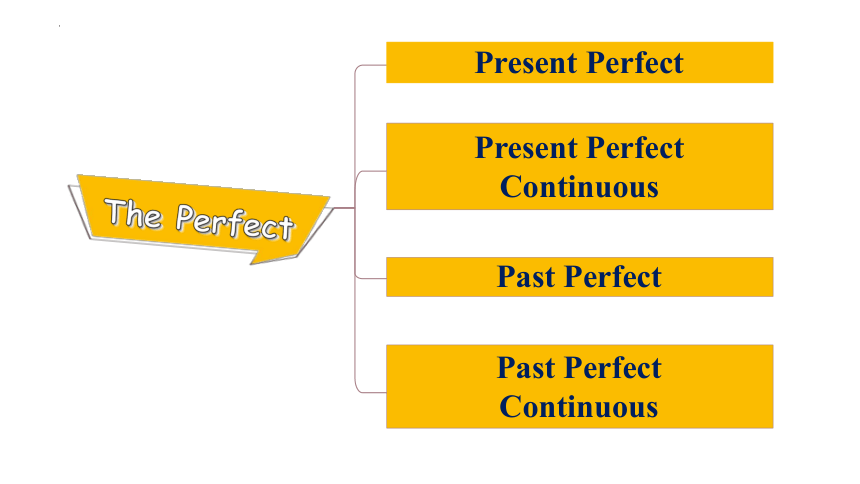
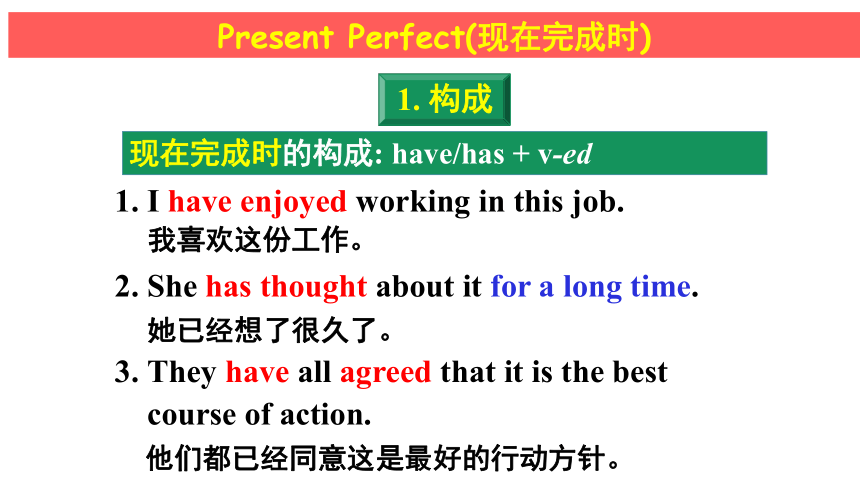

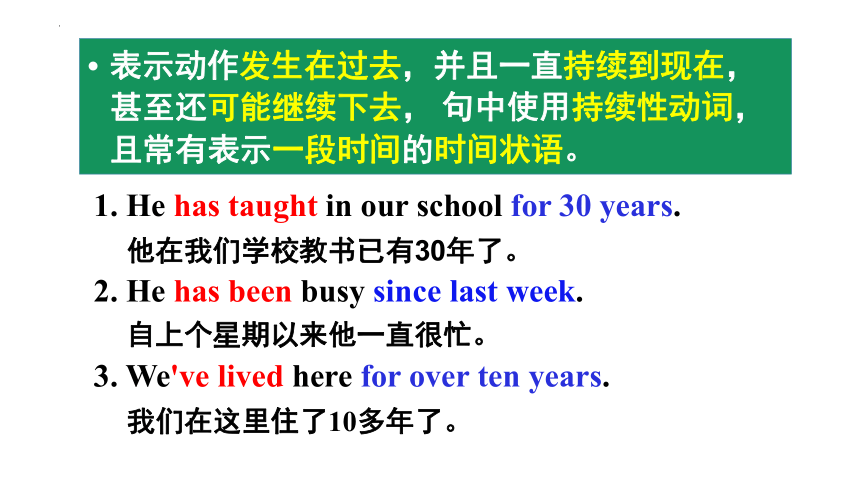
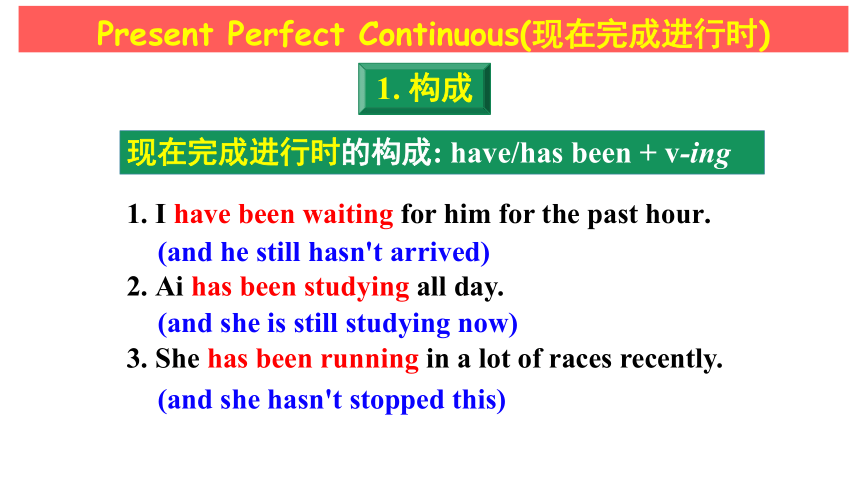
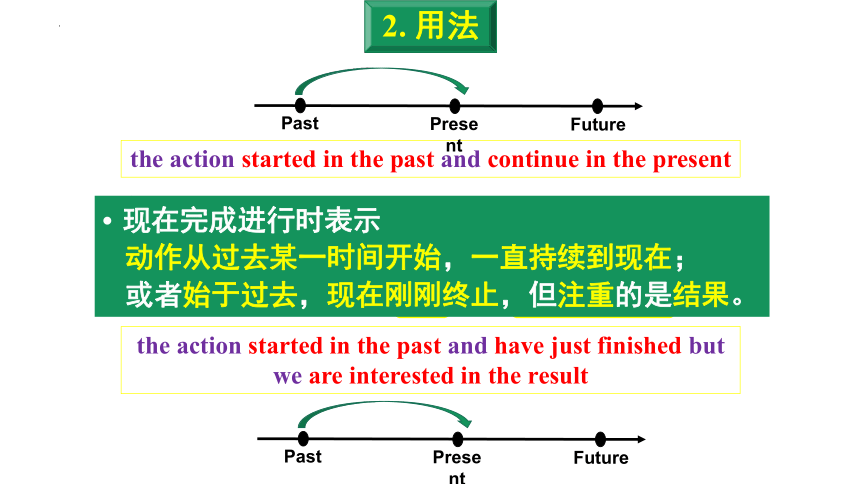
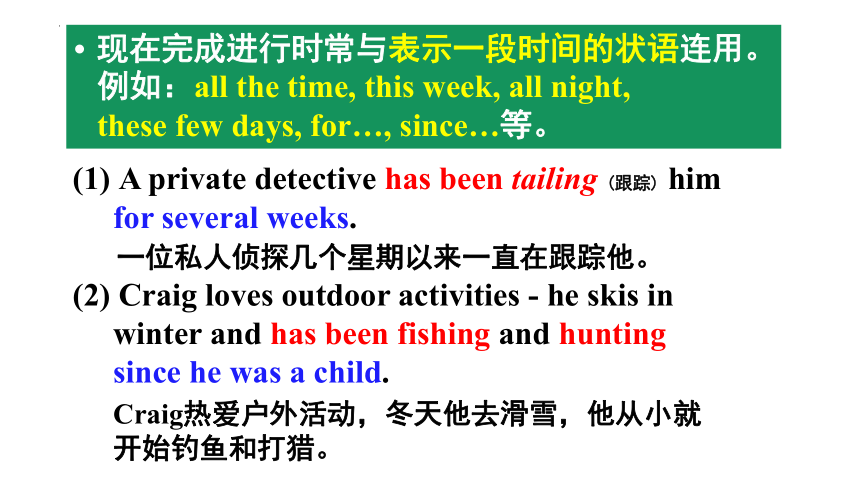
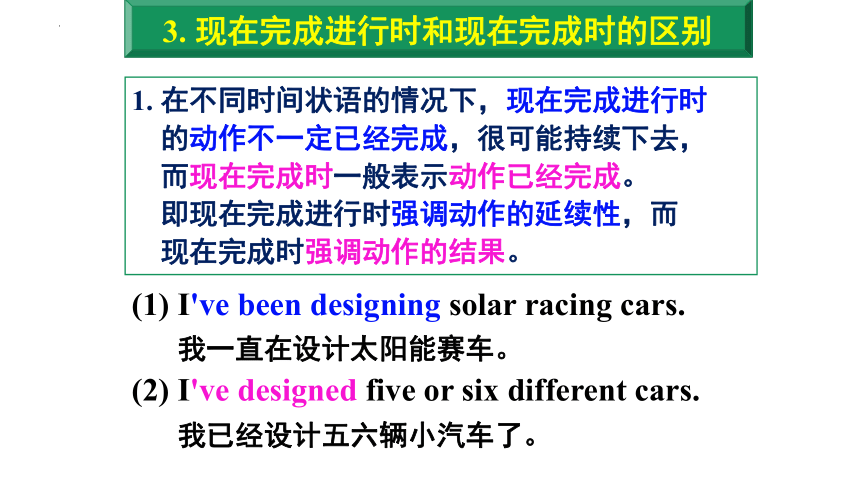
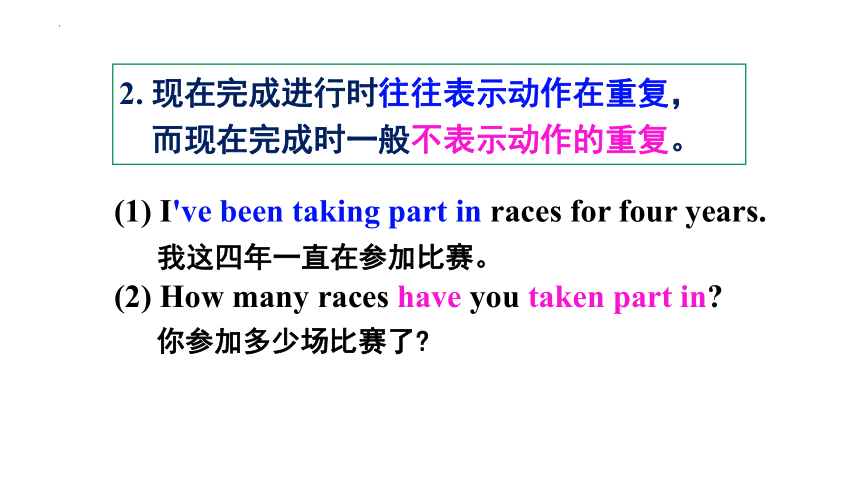
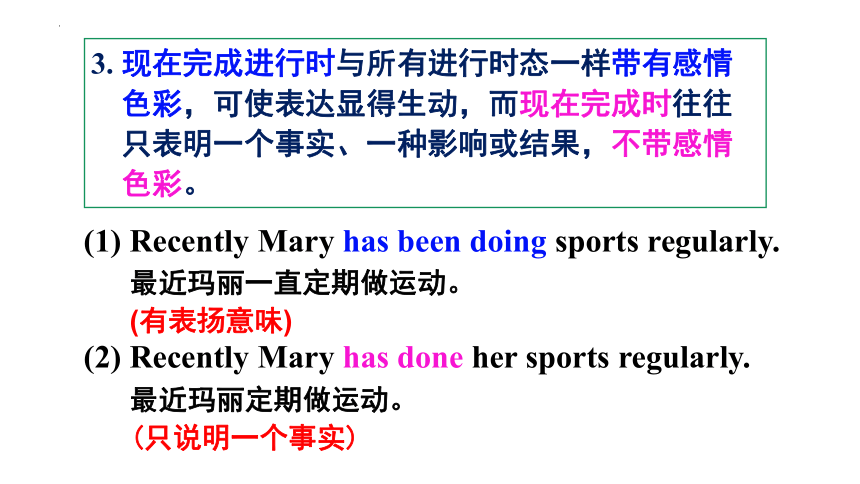
文档简介
(共35张PPT)
Human Biology
Unit 9
Focus on Language
The Perfect
完成时态
Pay attention to the underlined parts and get the structure they use.
I have visited California every summer since I was 18.
I have been painting the house all day. I'm exhausted.
The train had left before we arrived at the station.
He had been studying English for two years before he went to London.
Present Perfect: have/has + v-ed
Present Perfect Continuous: have/has been + v-ing
Past Perfect: had + v-ed
Past Perfect Continuous: had been + v-ing
Now, let’s learn more about the perfect.
Present Perfect
Present Perfect Continuous
Past Perfect
Past Perfect Continuous
The Perfect
1. 构成
1. I have enjoyed working in this job.
2. She has thought about it for a long time.
3. They have all agreed that it is the best
course of action.
我喜欢这份工作。
她已经想了很久了。
他们都已经同意这是最好的行动方针。
现在完成时的构成: have/has + v-ed
Present Perfect(现在完成时)
2. 用法
动作发生在过去, 强调对现在的结果、影响等。
1. He has been away from the city.
2. Someone has broken the window.
3. I've got a letter from my aunt.
他已离开这个城市。
(结果:他不在这个城市。)
有人把窗户打破了。
(结果:窗户仍破着。)
我收到姨母的一封信。
(结果:因此知道她的近况。)
表示动作发生在过去,并且一直持续到现在,
甚至还可能继续下去, 句中使用持续性动词,
且常有表示一段时间的时间状语。
1. He has taught in our school for 30 years.
2. He has been busy since last week.
3. We've lived here for over ten years.
他在我们学校教书已有30年了。
自上个星期以来他一直很忙。
我们在这里住了10多年了。
1. I have been waiting for him for the past hour.
2. Ai has been studying all day.
3. She has been running in a lot of races recently.
现在完成进行时的构成: have/has been + v-ing
1. 构成
(and he still hasn't arrived)
(and she is still studying now)
(and she hasn't stopped this)
Present Perfect Continuous(现在完成进行时)
2. 用法
① I've been looking for my dog and still
haven't found it.
② Her eyes are red. Has she been crying
the action started in the past and continue in the present
Past
Present
Future
the action started in the past and have just finished but we are interested in the result
Past
Present
Future
现在完成进行时表示
动作从过去某一时间开始,一直持续到现在;
或者始于过去,现在刚刚终止,但注重的是结果。
(1) A private detective has been tailing (跟踪) him
for several weeks.
(2) Craig loves outdoor activities - he skis in
winter and has been fishing and hunting
since he was a child.
一位私人侦探几个星期以来一直在跟踪他。
Craig热爱户外活动,冬天他去滑雪,他从小就
开始钓鱼和打猎。
现在完成进行时常与表示一段时间的状语连用。
例如:all the time, this week, all night,
these few days, for…, since…等。
(1) I've been designing solar racing cars.
(2) I've designed five or six different cars.
我一直在设计太阳能赛车。
我已经设计五六辆小汽车了。
1. 在不同时间状语的情况下,现在完成进行时
的动作不一定已经完成,很可能持续下去,
而现在完成时一般表示动作已经完成。
即现在完成进行时强调动作的延续性,而
现在完成时强调动作的结果。
3. 现在完成进行时和现在完成时的区别
(1) I've been taking part in races for four years.
(2) How many races have you taken part in
我这四年一直在参加比赛。
你参加多少场比赛了
2. 现在完成进行时往往表示动作在重复,
而现在完成时一般不表示动作的重复。
(1) Recently Mary has been doing sports regularly.
(2) Recently Mary has done her sports regularly.
最近玛丽一直定期做运动。
(有表扬意味)
最近玛丽定期做运动。
(只说明一个事实)
3. 现在完成进行时与所有进行时态一样带有感情
色彩,可使表达显得生动,而现在完成时往往
只表明一个事实、一种影响或结果,不带感情
色彩。
某些不具延续性含义的动词,如come, go, marry, die, finish等,不适用于现在完成进行时,但可
用于现在完成时。
We have finished the homework.
We have been finishing the homework.
我们已经完成了家庭作业。
(1) When I arrived Jane had just left.
(2) The play had already started when we
got to the theatre.
(3) By the end of June they had treated over 10,000 patients.
我到时简刚刚离开。
我们到剧场时戏已经开始了。
到六月底他们已经治疗了一万多病人。
过去完成时的构成: had + v-ed
1. 构成
Past Perfect (过去完成时)
(1) Before we got to the train station,
the train had already left.
(2) Before I could say “thank you”, he had
run away.
我们到达火车站之前,火车就已经离开了。
我还没来得及说谢谢,他就跑开了。
1. 表示在过去的某一时间或某一动作之前
完成的动作或存在的状态。
2. 用法
(1) By the end of last term, we had learnt
2,000 English words.
(2) They had lived there for ten years by then.
到上学期期末为止,我们已经学习了2,000个
英语单词了。
到那时为止,他们已经在那住了10年了。
2. 表示从过去某一时间开始,一直延续到过去
的另一个时间的动作,常用的时间状语有
by then, by the end of, by the time等。
(1) I had intended to meet him at the airport,
but I had an important meeting to attend.
(2) I had hoped to take a holiday this year but
I was not able to get away.
我本打算去机场接他,但是我有个重要的会议要参加。
我原打算今年去度假,可是我离不开。
3. 表示愿望、打算等的动词,如hope, want,
expect, think, mean, suppose, intend, plan等后
接从句时,一般用过去完成时表示本打算实现
而未实现的愿望和计划。
3.过去完成时用于一些固定句型:
It was the first time that I had visited the Great Wall.
这是我第一次参观长城。
(1) It/That was + the first/second… + time + that
从句,从句谓语常用过去完成时。
It was three years since he had joined the army.
他参军三年了。
(2) It was + 一段时间 + since从句,从句谓语用过去
完成时。
(1) Hardly had he got into his big office
when the telephone rang.
(2) No sooner had he arrived than he was
asked to leave again.
他刚进入他的大办公室, 电话铃响了。
(3) 在句型Hardly/Scarcely…when…和 No
sooner…than…中,主句常用过去完成
时, 从句用一般过去时,表示“一……
就……”。
他刚到就被要求离开。
1. 构成
1. I had been walking around all morning before
I found her.
2. We had been trying to find the right road for
nearly an hour before we finally spotted (看见) it.
3. They had been watching the series for three months.
过去完成进行时的构成:had been + v-ing
Past Perfect Continuous Tense (过去完成进行时)
(1) I had been looking for the book for days before
I found it.
(2) We had been waiting for him for over an hour
when he finally arrived.
表示过去某时开始并持续到过去某时的动作。
这本书我找了好多天才找着的。
我们等了他一个多小时,他终于到了。
Past
Present
Future
We use the past perfect continuous tense to describe an ongoing action that started in the past and continued for some time in the past.
2. 用法
(1) He had been mentioning your name to me.
(2) We had only been driving for about fifteen
minutes when Jill asked me to stop the car.
他过去多次向我提到过你的名字。
我们只开了大约15分钟,吉尔就让我停车。
表示过去某个确定的时间点内反复进行的动作。
(1) He said, “I have been speaking to John.”
(直接引语)
(2) He thought, “She was watching me when I
passed.” (直接引语)
过去完成进行时可用在said, supposed等引起
的间接引语中,代替现在完成进行时。
= He said that he had been speaking to John.
(间接引语)
= He thought that she had been watching him
when he had passed. (间接引语)
(1) I had only been reading a few minutes
when he came in.
(2) She'd only been reviewing her lessons for
a short while when her little sister interrupted her.
过去完成进行时之后也可接具有“突然”之意
的when分句。
我刚看了几分钟他就进来了。
她温习功课才一会儿,她妹妹就打断她了。
1. 不能用于进行时态的动词均不能用于过去完成进行时
(want / wish除外)。
The boy was delighted with his new toy.
He had been wanting one for a long time.
2. 过去完成进行时很少用于否定句,而多以过去完成时
代替。
He had not practiced English for many years.
(过去完成时)
He had not been practicing English for many years.
(很少见)
Identify the tense of the sentences and write the number in the correct columns.
1. Natural cloning has been going on for generations.
2. Gardeners have been using a form of cloning when they take a
cutting from a plant…
3. For years, there had been attempts to clone animals.
4. Cloning primates has proved to be “much harder” than
cloning other species.
5. Dr. Sun Qiang said they had been wholly devoted to the research…
6. Dr. Sun Qiang said they had been taking care of more than
1,000 monkeys 24 hours a day, 7 days a week…
Present perfect Present perfect continuous Past perfect Past perfect continous
4
1, 2
3, 5
6
P55 11
Complete the passage with the proper form of the words in brackets.
On Thursday, the Institute of Neuroscience announced it 1.___________ (clone) two monkeys using non-reproductive cells. It is reported that researchers all around the world 2.____________________ (conduct) tests on animals, such as mice and dogs, for many years but couldn't find a way to clone monkeys. The news of the successful cloning 3.____________ (attract) attention from around the world. However, cloning primates 4.______________
(also raise) ethical concerns. For example, some
people 5.__________________ (discuss) issues
concerning how clones will be treated in society.
had cloned
have been conducting
has attracted
have also raised
have been discussing
P55 12
had + v-ed
have / has been + v-ing
Present Perfect (现在完成时)
Present Perfect Continuous (现在完成进行时)
Past Perfect (过去完成时)
have / has + v-ed
The Perfect
(完成时)
had been + v-ing
Past Perfect Continuous
(过去完成进行时)
Ⅰ. 实战高考。
1. 【2021.6 浙江卷 语法填空】
It doesn't impress like George Washington's
plantation on the Potomac, but Lincoln's home
in downtown Springfield, Illinois, ___________
___________ (prove) irresistible to visitors
since it opened to the public.
2. 【2021.3 天津卷 单选】
We _____ quite enough work for the morning;
now let's take a break.
A. have done B. will do
C. had done D. were doing
has proved /
has proven
3.【2020 浙江卷 语法填空】
By about 6000 BC, people _____________
(discover) the best crops to grow and
animals to raise.
4.【2020 江苏卷 单选】
Instead of getting down to a new task as I
_____, he examined the previous work
again.
A. had expected B. have expected
C. would expect D. expect
had discovered
5.【2020 天津卷 单选】
- You are a great swimmer.
- Thanks. It's because I __ a lot these days.
A. have been practising
B. was practising
C. would practise
D. had practised
Ⅱ. 根据所给词的正确形式填空。
1. We _____________ (see) each other for ten
years.
2. We ___________ (visit) the country when we
were children.
3. He said they __________________ (do)
experiments on goats for the past two years.
4. Her organisation ________________ (collect)
money for those abandoned animals since it
was set up.
5. I ____________ (play) tennis in that club for
over a decade.
haven't seen
had visited
had been doing
has been collecting
had played
6. Sandy ________________ (teach) for
sixteen years, and has explored some
effective teaching methods.
7. He __________ (work) for us ever since he
left school.
8. Dave _______________ (drive) for an hour
when his car broke down.
9. She __________ (go) to the cinema when I
called.
10. I ________________ (sleep) when my
friend telephoned me.
has been teaching
has worked
had been driving
had gone
had been sleeping
How well can you do them Very well Fairly well Not very well
I know the function of the perfect.
I can figure out the perfect in a sentence.
I can use the perfect in my writing.
各个击破
Self-evaluation
Write a short passage to introduce
the research process of cloning by
using the perfect we have learned
today.
Human Biology
Unit 9
Focus on Language
The Perfect
完成时态
Pay attention to the underlined parts and get the structure they use.
I have visited California every summer since I was 18.
I have been painting the house all day. I'm exhausted.
The train had left before we arrived at the station.
He had been studying English for two years before he went to London.
Present Perfect: have/has + v-ed
Present Perfect Continuous: have/has been + v-ing
Past Perfect: had + v-ed
Past Perfect Continuous: had been + v-ing
Now, let’s learn more about the perfect.
Present Perfect
Present Perfect Continuous
Past Perfect
Past Perfect Continuous
The Perfect
1. 构成
1. I have enjoyed working in this job.
2. She has thought about it for a long time.
3. They have all agreed that it is the best
course of action.
我喜欢这份工作。
她已经想了很久了。
他们都已经同意这是最好的行动方针。
现在完成时的构成: have/has + v-ed
Present Perfect(现在完成时)
2. 用法
动作发生在过去, 强调对现在的结果、影响等。
1. He has been away from the city.
2. Someone has broken the window.
3. I've got a letter from my aunt.
他已离开这个城市。
(结果:他不在这个城市。)
有人把窗户打破了。
(结果:窗户仍破着。)
我收到姨母的一封信。
(结果:因此知道她的近况。)
表示动作发生在过去,并且一直持续到现在,
甚至还可能继续下去, 句中使用持续性动词,
且常有表示一段时间的时间状语。
1. He has taught in our school for 30 years.
2. He has been busy since last week.
3. We've lived here for over ten years.
他在我们学校教书已有30年了。
自上个星期以来他一直很忙。
我们在这里住了10多年了。
1. I have been waiting for him for the past hour.
2. Ai has been studying all day.
3. She has been running in a lot of races recently.
现在完成进行时的构成: have/has been + v-ing
1. 构成
(and he still hasn't arrived)
(and she is still studying now)
(and she hasn't stopped this)
Present Perfect Continuous(现在完成进行时)
2. 用法
① I've been looking for my dog and still
haven't found it.
② Her eyes are red. Has she been crying
the action started in the past and continue in the present
Past
Present
Future
the action started in the past and have just finished but we are interested in the result
Past
Present
Future
现在完成进行时表示
动作从过去某一时间开始,一直持续到现在;
或者始于过去,现在刚刚终止,但注重的是结果。
(1) A private detective has been tailing (跟踪) him
for several weeks.
(2) Craig loves outdoor activities - he skis in
winter and has been fishing and hunting
since he was a child.
一位私人侦探几个星期以来一直在跟踪他。
Craig热爱户外活动,冬天他去滑雪,他从小就
开始钓鱼和打猎。
现在完成进行时常与表示一段时间的状语连用。
例如:all the time, this week, all night,
these few days, for…, since…等。
(1) I've been designing solar racing cars.
(2) I've designed five or six different cars.
我一直在设计太阳能赛车。
我已经设计五六辆小汽车了。
1. 在不同时间状语的情况下,现在完成进行时
的动作不一定已经完成,很可能持续下去,
而现在完成时一般表示动作已经完成。
即现在完成进行时强调动作的延续性,而
现在完成时强调动作的结果。
3. 现在完成进行时和现在完成时的区别
(1) I've been taking part in races for four years.
(2) How many races have you taken part in
我这四年一直在参加比赛。
你参加多少场比赛了
2. 现在完成进行时往往表示动作在重复,
而现在完成时一般不表示动作的重复。
(1) Recently Mary has been doing sports regularly.
(2) Recently Mary has done her sports regularly.
最近玛丽一直定期做运动。
(有表扬意味)
最近玛丽定期做运动。
(只说明一个事实)
3. 现在完成进行时与所有进行时态一样带有感情
色彩,可使表达显得生动,而现在完成时往往
只表明一个事实、一种影响或结果,不带感情
色彩。
某些不具延续性含义的动词,如come, go, marry, die, finish等,不适用于现在完成进行时,但可
用于现在完成时。
We have finished the homework.
We have been finishing the homework.
我们已经完成了家庭作业。
(1) When I arrived Jane had just left.
(2) The play had already started when we
got to the theatre.
(3) By the end of June they had treated over 10,000 patients.
我到时简刚刚离开。
我们到剧场时戏已经开始了。
到六月底他们已经治疗了一万多病人。
过去完成时的构成: had + v-ed
1. 构成
Past Perfect (过去完成时)
(1) Before we got to the train station,
the train had already left.
(2) Before I could say “thank you”, he had
run away.
我们到达火车站之前,火车就已经离开了。
我还没来得及说谢谢,他就跑开了。
1. 表示在过去的某一时间或某一动作之前
完成的动作或存在的状态。
2. 用法
(1) By the end of last term, we had learnt
2,000 English words.
(2) They had lived there for ten years by then.
到上学期期末为止,我们已经学习了2,000个
英语单词了。
到那时为止,他们已经在那住了10年了。
2. 表示从过去某一时间开始,一直延续到过去
的另一个时间的动作,常用的时间状语有
by then, by the end of, by the time等。
(1) I had intended to meet him at the airport,
but I had an important meeting to attend.
(2) I had hoped to take a holiday this year but
I was not able to get away.
我本打算去机场接他,但是我有个重要的会议要参加。
我原打算今年去度假,可是我离不开。
3. 表示愿望、打算等的动词,如hope, want,
expect, think, mean, suppose, intend, plan等后
接从句时,一般用过去完成时表示本打算实现
而未实现的愿望和计划。
3.过去完成时用于一些固定句型:
It was the first time that I had visited the Great Wall.
这是我第一次参观长城。
(1) It/That was + the first/second… + time + that
从句,从句谓语常用过去完成时。
It was three years since he had joined the army.
他参军三年了。
(2) It was + 一段时间 + since从句,从句谓语用过去
完成时。
(1) Hardly had he got into his big office
when the telephone rang.
(2) No sooner had he arrived than he was
asked to leave again.
他刚进入他的大办公室, 电话铃响了。
(3) 在句型Hardly/Scarcely…when…和 No
sooner…than…中,主句常用过去完成
时, 从句用一般过去时,表示“一……
就……”。
他刚到就被要求离开。
1. 构成
1. I had been walking around all morning before
I found her.
2. We had been trying to find the right road for
nearly an hour before we finally spotted (看见) it.
3. They had been watching the series for three months.
过去完成进行时的构成:had been + v-ing
Past Perfect Continuous Tense (过去完成进行时)
(1) I had been looking for the book for days before
I found it.
(2) We had been waiting for him for over an hour
when he finally arrived.
表示过去某时开始并持续到过去某时的动作。
这本书我找了好多天才找着的。
我们等了他一个多小时,他终于到了。
Past
Present
Future
We use the past perfect continuous tense to describe an ongoing action that started in the past and continued for some time in the past.
2. 用法
(1) He had been mentioning your name to me.
(2) We had only been driving for about fifteen
minutes when Jill asked me to stop the car.
他过去多次向我提到过你的名字。
我们只开了大约15分钟,吉尔就让我停车。
表示过去某个确定的时间点内反复进行的动作。
(1) He said, “I have been speaking to John.”
(直接引语)
(2) He thought, “She was watching me when I
passed.” (直接引语)
过去完成进行时可用在said, supposed等引起
的间接引语中,代替现在完成进行时。
= He said that he had been speaking to John.
(间接引语)
= He thought that she had been watching him
when he had passed. (间接引语)
(1) I had only been reading a few minutes
when he came in.
(2) She'd only been reviewing her lessons for
a short while when her little sister interrupted her.
过去完成进行时之后也可接具有“突然”之意
的when分句。
我刚看了几分钟他就进来了。
她温习功课才一会儿,她妹妹就打断她了。
1. 不能用于进行时态的动词均不能用于过去完成进行时
(want / wish除外)。
The boy was delighted with his new toy.
He had been wanting one for a long time.
2. 过去完成进行时很少用于否定句,而多以过去完成时
代替。
He had not practiced English for many years.
(过去完成时)
He had not been practicing English for many years.
(很少见)
Identify the tense of the sentences and write the number in the correct columns.
1. Natural cloning has been going on for generations.
2. Gardeners have been using a form of cloning when they take a
cutting from a plant…
3. For years, there had been attempts to clone animals.
4. Cloning primates has proved to be “much harder” than
cloning other species.
5. Dr. Sun Qiang said they had been wholly devoted to the research…
6. Dr. Sun Qiang said they had been taking care of more than
1,000 monkeys 24 hours a day, 7 days a week…
Present perfect Present perfect continuous Past perfect Past perfect continous
4
1, 2
3, 5
6
P55 11
Complete the passage with the proper form of the words in brackets.
On Thursday, the Institute of Neuroscience announced it 1.___________ (clone) two monkeys using non-reproductive cells. It is reported that researchers all around the world 2.____________________ (conduct) tests on animals, such as mice and dogs, for many years but couldn't find a way to clone monkeys. The news of the successful cloning 3.____________ (attract) attention from around the world. However, cloning primates 4.______________
(also raise) ethical concerns. For example, some
people 5.__________________ (discuss) issues
concerning how clones will be treated in society.
had cloned
have been conducting
has attracted
have also raised
have been discussing
P55 12
had + v-ed
have / has been + v-ing
Present Perfect (现在完成时)
Present Perfect Continuous (现在完成进行时)
Past Perfect (过去完成时)
have / has + v-ed
The Perfect
(完成时)
had been + v-ing
Past Perfect Continuous
(过去完成进行时)
Ⅰ. 实战高考。
1. 【2021.6 浙江卷 语法填空】
It doesn't impress like George Washington's
plantation on the Potomac, but Lincoln's home
in downtown Springfield, Illinois, ___________
___________ (prove) irresistible to visitors
since it opened to the public.
2. 【2021.3 天津卷 单选】
We _____ quite enough work for the morning;
now let's take a break.
A. have done B. will do
C. had done D. were doing
has proved /
has proven
3.【2020 浙江卷 语法填空】
By about 6000 BC, people _____________
(discover) the best crops to grow and
animals to raise.
4.【2020 江苏卷 单选】
Instead of getting down to a new task as I
_____, he examined the previous work
again.
A. had expected B. have expected
C. would expect D. expect
had discovered
5.【2020 天津卷 单选】
- You are a great swimmer.
- Thanks. It's because I __ a lot these days.
A. have been practising
B. was practising
C. would practise
D. had practised
Ⅱ. 根据所给词的正确形式填空。
1. We _____________ (see) each other for ten
years.
2. We ___________ (visit) the country when we
were children.
3. He said they __________________ (do)
experiments on goats for the past two years.
4. Her organisation ________________ (collect)
money for those abandoned animals since it
was set up.
5. I ____________ (play) tennis in that club for
over a decade.
haven't seen
had visited
had been doing
has been collecting
had played
6. Sandy ________________ (teach) for
sixteen years, and has explored some
effective teaching methods.
7. He __________ (work) for us ever since he
left school.
8. Dave _______________ (drive) for an hour
when his car broke down.
9. She __________ (go) to the cinema when I
called.
10. I ________________ (sleep) when my
friend telephoned me.
has been teaching
has worked
had been driving
had gone
had been sleeping
How well can you do them Very well Fairly well Not very well
I know the function of the perfect.
I can figure out the perfect in a sentence.
I can use the perfect in my writing.
各个击破
Self-evaluation
Write a short passage to introduce
the research process of cloning by
using the perfect we have learned
today.
